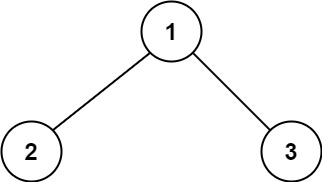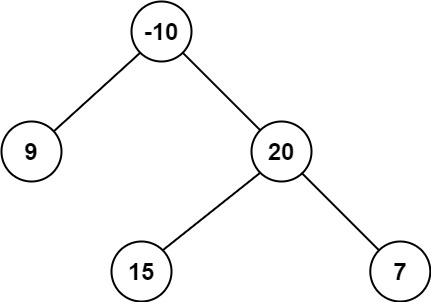LeetCode-in-All
124. Binary Tree Maximum Path Sum
Hard
A path in a binary tree is a sequence of nodes where each pair of adjacent nodes in the sequence has an edge connecting them. A node can only appear in the sequence at most once. Note that the path does not need to pass through the root.
The path sum of a path is the sum of the node’s values in the path.
Given the root of a binary tree, return the maximum path sum of any non-empty path.
Example 1:

Input: root = [1,2,3]
Output: 6
Explanation: The optimal path is 2 -> 1 -> 3 with a path sum of 2 + 1 + 3 = 6.
Example 2:

Input: root = [-10,9,20,null,null,15,7]
Output: 42
Explanation: The optimal path is 15 -> 20 -> 7 with a path sum of 15 + 20 + 7 = 42.
Constraints:
- The number of nodes in the tree is in the range
[1, 3 * 104]. -1000 <= Node.val <= 1000
Solution
/**
* Definition for a binary tree node.
* class TreeNode {
* int val;
* TreeNode? left;
* TreeNode? right;
* TreeNode([this.val = 0, this.left, this.right]);
* }
*/
class Solution {
int _max = -999999999;
int _helper(TreeNode? root) {
if (root == null) {
return 0;
}
// Avoid negative values by comparing with 0
int left = _helper(root.left).clamp(0, 999999999);
int right = _helper(root.right).clamp(0, 999999999);
int current = root.val + left + right;
// Update max if current path sum is greater
if (current > _max) {
_max = current;
}
// Return the max path sum that can be used by the parent node
return root.val + left.max(right);
}
int maxPathSum(TreeNode? root) {
_helper(root);
return _max;
}
}
extension IntExtension on int {
int max(int other) => this > other ? this : other;
}

